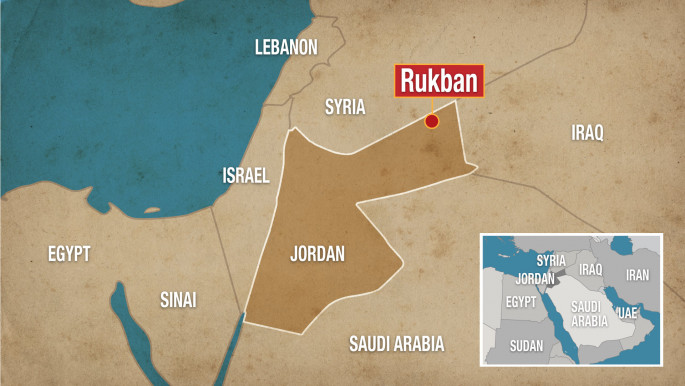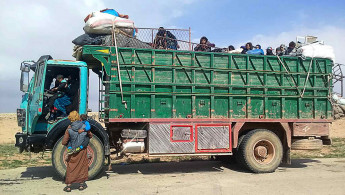Hundreds of Syrian refugees leave besieged Rukban camp, despite fears of regime oppression
Hundreds of Syrian refugees left Rukban camp on the Syria-Jordan border on Monday in what has been described as the biggest push by the Russians to evacuate the camp.
This brings the number of those leaving the camp to roughly 3,200, transported in 180 private cars, according to pro-regime media.
Local sources in the camp confirmed this has been the largest evacuation since the Russians opened two "humanitarian corridors" but were unable to pinpoint the number of evacuees.
Three to four thousand residents - mostly women, children and elderly - left Sunday, according to EA Worldview. They have to pay to be taken first to a Russian-manned checkpoint and then to centre in central Syria, controlled by the Syrian regime.
Russia urged the immediate evacuation of Syrian refugees from Rukban camp in February, despite residents' misgivings about returning to areas under Syrian regime control. Men were particularly concerned they could be targeted by regime authorities as potential opponents or forced into the army.
Russia has threatened to block aid to the camp and force men into the army unless refugees leave the area.
 |
The Russian Ambassador to the UN Vasily Nebenzya alleged that a survey carried out by UN officers in the camp showed that 95 percent of its inhabitants wanted to leave, and that 80 percent wanted to return to areas under Syrian regime control.
Despite this, when Russia opened up two "humanitarian corridors" to transport refugees back to Syria in February, not a single person used them.
Rukban residents have reason to fear crossing to regime-held areas. Russia's ministry of defence said that, while checkpoints at the corridors would offer food, clothing, medical checkups and other vital support dispaced Syrians have been lacking. Syrian "law enforcement agencies" also operate checkpoints and "escort" civilians to other destinations.
IDP's in Rukban camp face harsh conditions. Two infants died in March in the remote camp, which faced brutal winter conditions and a near total blockade on supplies over the past months.
The camp was left destitute in February after going for over three months without vital aid deliveries, due to its isolated desert location, weather disruption and the security situation in southwestern Syria. The aid delivered in February was one of two over the past year - residents said it would only last a month.
The camp is located inside a "deconflict zone" set up by the US-led international coalition in 2016, which Washington saw as a strategic foothold while it launched an offensive against the Islamic State group. The camp is also close to an Iranian weapons supply route entering Syria from Iraq.
Following the announcement that the US is to withdraw from Syria, Rukban's residents became wary of the consequences, with only fighters allied to the Free Syrian Army able to protect them.
Around 50,000 civilians live in the remote camp, most of them internally displaced people (IDPs) from Homs, Deir az-Zour, and Deraa. Some 80 percent of the residents are women and children.
Most residents in Rukban were forced to leave their homes due to Syrian regime and Russian aerial bombardments. With the vast majority of the country back under the hold of the regime, many refugees fear arrest, torture and even death if they return.
Agencies contributed to this report.
Follow us on Twitter: @The_NewArab





 Follow the Middle East's top stories in English at The New Arab on Google News
Follow the Middle East's top stories in English at The New Arab on Google News


